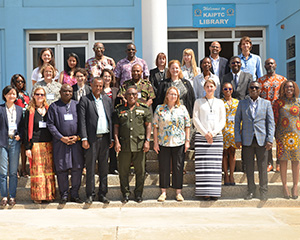Interventions aimed at building peace and rebuilding societies after violent conflict have become an important aspect of international politics. The issue of the conditions and normative preconditions under which such intervention practices can be successful is increasingly being explored. In the literature dealing with international peacebuilding practices and their transformation, the role of coercion is becoming more and more important. This topic was also addressed in the international research workshop “The Role of Coercion in Peacebuilding: Insights from Africa in an Interregional Perspective.” The workshop took place at the Kofi Annan International Peacekeeping Training Centre (KAIPTC) in Accra, Ghana, from October 5-7, 2022, and was organized by KAIPTC together with PRIF and the Institute for Peace and Security Studies (IPSS), Addis Ababa, Ethiopia. The report on the workshop is now available for download.
The role of coercion in international peacebuilding is often framed in the context of the increasing engagement of so-called “new,” “non-traditional,” “emerging,” or non-Western actors. This raises two questions: (1) Are emerging peacebuilding actors from the Global South adopting specific approaches – perhaps of a less coercive nature-that differ from the global mainstream of “liberal” peacebuilding? And, (2) to what extent is this mainstream being challenged or altered by the increasing presence of such “new” actors? Systematic research on the role of coercion in peacebuilding – both globally and with regard to Africa in particular – has been scarce. For this reason, discussing conceptualizations and identifying different types of coercion in peacebuilding was a key component of the workshop. The report now published summarizes the deliberations.
Download: Workshop Report “The Role of Coercion in Peacebuilding”
